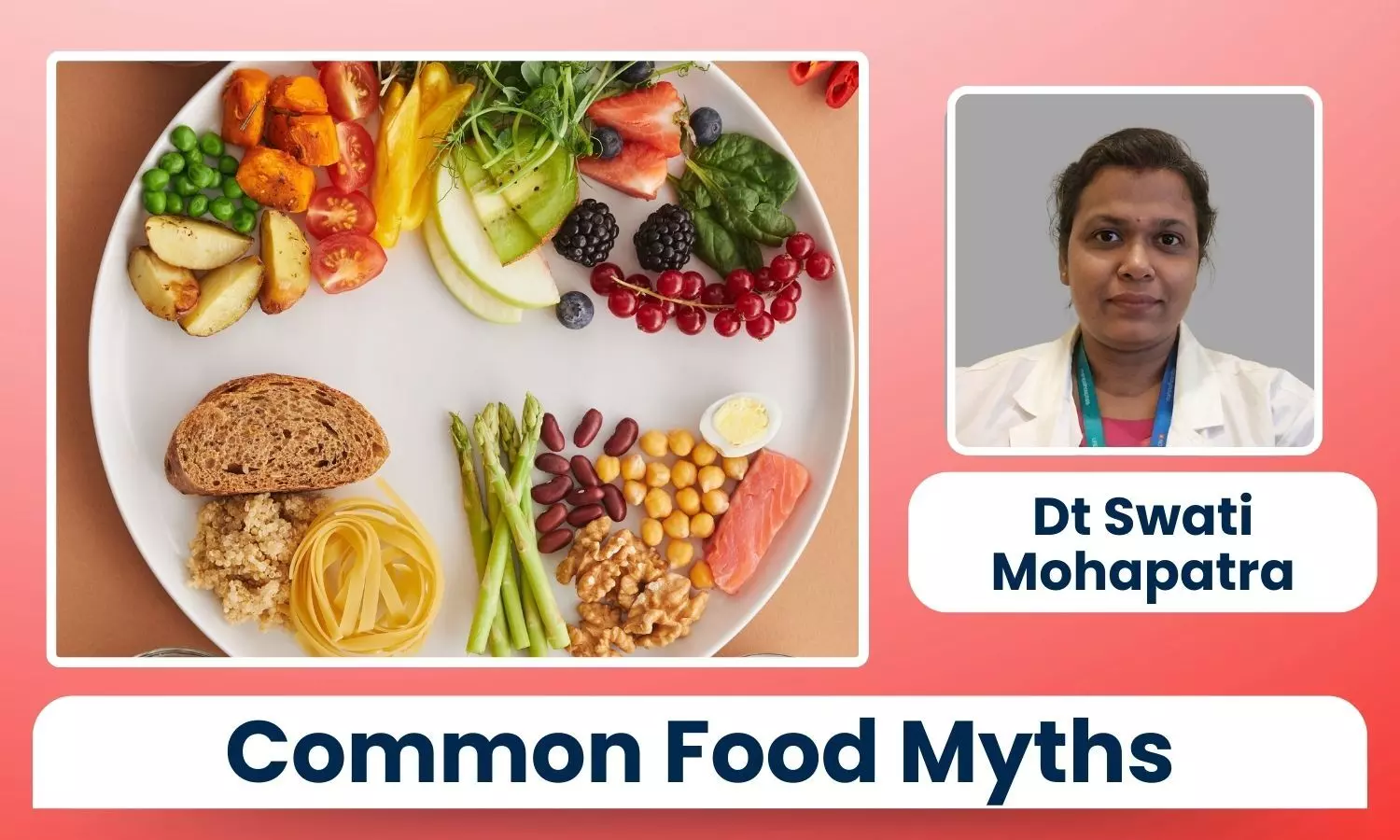From Carbs to Calories: Truth About Common Food Myths - Dt Swati Mohapatra

Myth 1-Carbs are bad food
Many people believe that carbohydrates are bad, but that is not true. Carbohydrates are an important source of energy for the body. Only restrict refined carbohydrates.
Myth 2- All Calories are the same
Different nutrients have different calories. Some are high in calories, while others are low in calories, such as vegetables & fruits.
Myth 3- Dairy is a must for bone health
Leafy vegetables, soya products, beans, and lentils are also rich in calcium. You can also add all these options for calcium.
Myth 4-Multivitamins for women are only for weight loss
Multivitamins are supplements to cure deficiencies; they have no role in reducing weight. It will only support the health, particularly the bone, immunity.
Myth 5- To lose weight, you have to give up your favourite food
For weight weight-reducing diet, it is important to follow a healthy option, but sometimes you can take your favourite food, but in moderation. Observe the intake of calories properly.
Myth 6- Choosing gluten-free food helps to reduce weight
Gluten-free food is specially for those who are suffering from Celiac Disease or are not able to tolerate Gluten. Gluten is a protein found in wheat, suji, and rye. A gluten-free diet does not help in weight reduction.
Myth 7- Going vegetarian helps to lose weight
Weight reduction is totally dependent upon your calorie intake & physical activities. In a vegetarian diet, if you take high-calorie, fried foods, it will increase your weight.
Myth- 8- You should not eat after 7 pm, even a small grape.
Late-night snacking may cause bad effects to health, but if you choose healthy light options like boiled vegetables, soup, and fruits, then it won’t give any harm to the body.
Myth-9 Intermittent fasting works for all
Every person has a different body structure & metabolism. It is practically impossible that one type of diet plan will work for everyone's body. Intermittent fasting should be followed with proper guidance & supervision.
Myth-10 –Supplements can replace a Healthy Diet
Supplements are beneficial in some cases, but they won’t replace the healthy, natural diet like whole grains, pulses, nuts, etc. Supplements can be taken for a short period of time. For a long-term option Healthy, balanced diet is best.
Myth 11- In pregnancy, eating for two means double food intake
In the 1st trimester, there is no need to add more calories to the diet. In the 2nd & 3rd trimester, add 300 more calories to your required calorie intake; no need to double the calories.
Myth-12 All herbal teas are good in pregnancy
Many herbal teas are good in pregnancy, but some have an adverse effect in pregnancy. Certain herbal teas may stimulate uterine contraction.
Myth 13- A Vegetarian diet is not good in pregnancy
A healthy vegetarian diet can be a good option in pregnancy. But for vitamin B12 & Omega-3 fatty acids, you have to add supplements. Plant-based healthy protein & milk products can be a good choice for protein.
Myth 14- Avoid Dairy when you have a cold
Milk does not cause mucus production in the nose during a cold. Due to its creamy structure, people think that it will create.
Myth 15- Brown sugar is better than white sugar
The only difference between brown and white sugar is that brown sugar contains molasses. Both brown & white sugar give the same energy.
Myth 16- Eating too much sugar causes diabetes
Diabetes is a lifestyle disease caused by several things, like family history, lack of physical activity, being overweight, and hormonal imbalance. Eating sugar doesn’t directly cause diabetes.
Disclaimer: The views expressed in this article are of the author and not of Health Dialogues. The Editorial/Content team of Health Dialogues has not contributed to the writing/editing/packaging of this article.


